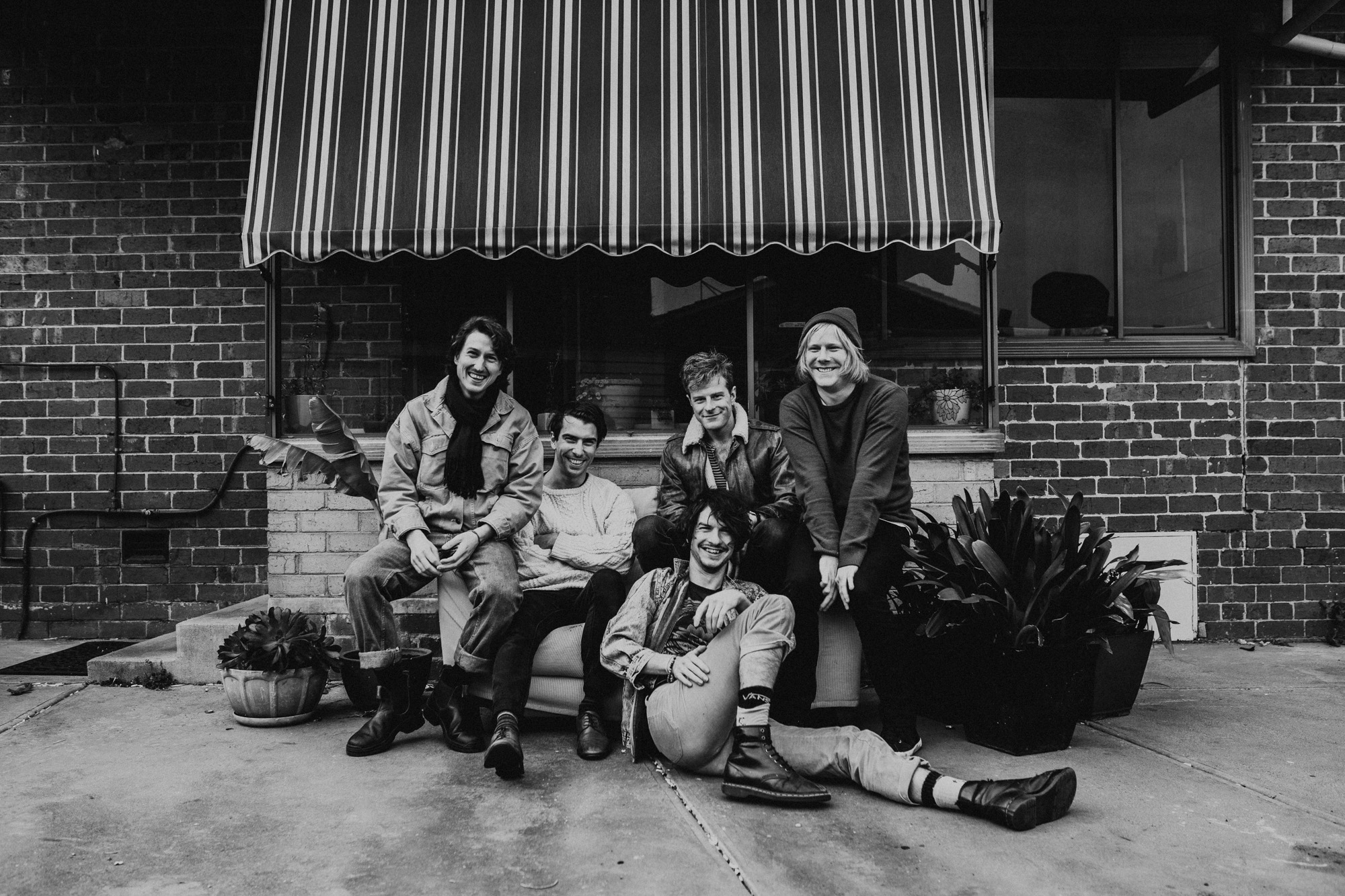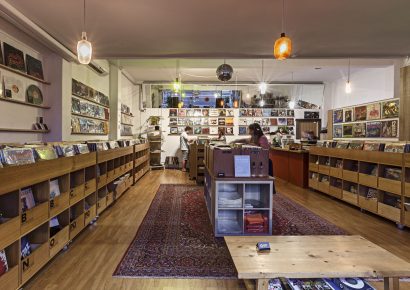Lead singer Jules McKenzie unpacks the LP track-by-track.
1 – ‘Hold’
When we first started talking about the next Money For Rope record, we were staying at a friends’ studio that was under construction in Seven Sisters in the north of London, and walking every day along the canal, talking about life, talking about music. We were a long way from home and unsure when we’d be back; we’d lost band members while we were away. We would joke about how we wanted our band to make music that felt like crawling back into the womb, being held, that everyone wanted to be held like they were when they were a child.
When we arrived back home, we didn’t tell anyone we had returned. We went to a family property out of town, beside the ocean, and made this record. The house became involved and the songs were written with reverence for that landscape; Port Philip Bay, and the Southern Ocean. We wanted guitars to be keyboards, keyboards to be saturation, and drums to be folded over into themselves like tape worn away, like rocks eroding by the relentless southerlies blowing the ocean onto the land. ‘Hold’ has a percussion track, made by an old box of sailing boat parts, being shaken, warbling through an old tape machine. Being in a band sometimes means you are hoping, and holding on.
2 – ‘Actually’
This was the first track written for this record. We started working on it staying in a small Airbnb flat in Berlin owned by someone who worked for a music products company; there was an upright piano in a beautiful first-floor apartment in an old building. We could spend our evenings in the middle of a hot summer heat wave playing battery amps and piano with the windows wide open listening to the sounds of Kruezberg below. We would wander around the city late at night, wondering how we became fortunate enough to be here; it was a place we had always wanted to be.
3 – ‘Stretched My Neck’
In some way I feel like every song that has been written is a love song. Music often falls to the expression of yearning, loss, pain; it’s just sometimes easier to write for the negative as the positives come out in other ways, without being coaxed. The songs of loss and fear would not exist had there not also have been love. I had fallen in love with a friend; she gave me a t-shirt; it was too small; she fixed it. We never ended up together, and we still love each other. We started recording this song when we arrived at the beach because sometimes the fun things are best tackled first.
4 – ‘O’Chelles’
When I was young I lived in a townhouse owned by my partner’s family, which afforded us cheap rent in a nice location. The house was old and the wind used to come through the skirting boards, and the heater would work all evening to keep us warm. We could hear the neighbours in the adjoining house walking up and down their hallway, you could tell where they were standing as the old floorboards each had a different creak.
I was trying to re-learn French and fancied disappearing to work as a garçon or live in the Alps. I loved that house; it was home for many years, but I always felt like an outsider, looking in, on someone else’s home, in someone else’s street, in a suburb where I did not belong. I started writing this song there and finished it on the last day we were making this record; some ten years later.
5 – ‘Remember My Name’
The best thing about being in a band is being surrounded by your friends; your band becomes your family. You eat together, you work together, you live together. This song always makes me think of walking down the canals from the Seven Sisters to Stratford [in London]. We would all walk at the same pace, picking blackberries off the side of the pathway, talking about art, music, and how one day we’d be recording these songs. It’s almost the opposite side of the world where we turned the master bedroom into a control room and there were no neighbours to upset because it was a beach house.
6 – ‘Earl Grey’
I have always had a problem retaining information when I read fiction. I have had many people encourage me, including a partner who gave me a copy of the Richard Brautigan novel, Trout Fishing in America. “It’s short, you can start there.” We used to spend days drinking cup of tea, after cup of tea. I still don’t retain information when I read fiction.
Out the back of the house where we recorded this album, in what is a town that is only busy over summer, is the roaring Bass Strait. We would sit and watch the ocean sometimes, seeing great swathes of seaweed being tossed around effortlessly by the Southern Ocean, and I would think about drinking all those cups of tea, and what a long time ago and how far away that was. They say the sea will rise seven metres if the arctic ice cap melts. The house may not disappear under the ocean but the tides will certainly take it away.
7 – ‘Trashtown’
There is evidence of aboriginal middens on the coast out the back of the house where we recorded Picture Us. These collections of shells are what’s left to indicate that this beach was home for many generations before us. We lived off fish we caught while we were making these songs and when we did not catch fish on a line, we got into the water to find them. Commercial fishing was terminated in the bay around the time this record was made; perhaps that will help fish sustainability in the area, perhaps it will not. Several times a day huge container ships would navigate the treacherous rip, cross paths, enter or disappear off to deep water and out of sight; they would carry goods, carry people, carry fuels – it’s a constant trade.
8 – ‘Look’
On the Mediterranean, there is a town called Alicante which is supposedly home to the world’s best horchata. Rising out of the ocean is a mountain that housed an ancient lookout and city walls, from where the whole town and beach can be supervised. We drifted out on the water, floating, staring up at the sun until the whole mountain came to perspective. The water is safe, there are no sharks, there is no undertow; you can float and watch the town and the palm trees shimmering in the breeze, and always come home to the finest horchata in the world.
9 – ‘Picture Us’
When I was young and left home alone along with my brother, I was surprised by my parents, who had returned home from holidays early. I was rapidly cleaning up from a party, and wearing what was, unaware to me, dad’s best suit. It seems that when you are young you long to be older, and I wonder if when I am older, I will long to be young again. We recorded this through walkie-talkies we had as kids; a device which was able to give the alphabet in Morse code.
10 – ‘What Takes So Long’
The house which we recorded the album was built in the ’60s from asbestos fibreboards, with wallpapered plywood walls. The bannister railings are eroded with rust like stalactites growing from the constant swirling salt air. The lady who owned it previously had children who all moved on – her late partner’s tools are still in collection underneath the shed. I wonder whether this house will ever see children of my own, one day. But that is a problem for the future, because tonight, we are all cooking together.
Money For Rope’s new album Picture Us is now out via Cheersquad Records and is available via all streaming platforms. The band will launch the LP at The Gasometer on Wednesday April 24 (Anzac Day Eve).







